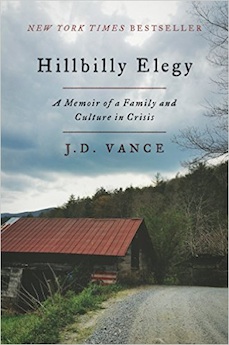By Kayleigh Whitman
J.D. Vance opens his captivating memoir, Hillbilly Elegy, with a confession: he has done nothing great in his thirty-one years of life and certainly nothing that would justify a stranger spending money to read about it. Still, Vance’s text has remained on the New York Times Best Sellers List for twenty-five weeks. Readers have flocked to Hillbilly Elegy in an effort to understand the white working class and their politics during the 2016 presidential election. Though he may not feel qualified, Vance, a graduate of Yale Law School and veteran of the United States Marine Corps, has for the time being become a voice for a group of people he suggests has been misunderstood by the American populace.
Hillbilly Elegy is the story of Vance’s childhood in Middletown, Ohio, his hillbilly family, and how he experienced the “American Dream.” Vance’s voice is tender, yet critical – emotional and succinct. The reader gets a vivid picture of growing up in working class poverty, as well as a glimpse into the impact (real or perceived) of public policy on the families who make up this community. The story begins with Vance’s great grandmother, Mamaw Blanton. Mamaw Blanton and her children are the reader’s first examples of “Hill People.” This is the affectionate name Vance and his family use to describe themselves and their neighbors in the hollers and hills of Jackson, Kentucky. The text describes these people as kind hearted – always saying hello, helping their neighbor with car troubles, and getting out of their cars when a funeral procession passes. They are proud of their culture and their identity. However, Vance also writes that they live in poverty, are plagued by prescription drug addiction, and are physically unhealthy, as many of them do not have access to healthcare. As Vance takes the reader through the story of his life identifying these qualities is critical as they establish a long history of crisis, exacerbated by later economic turmoil in the Rust Belt.
Vance’s Mamaw (Mamaw Blanton’s daughter) and Papaw, along with many other Appalachian transplants, settled in Middletown, Ohio, to work for Armco Steel during the middle of the twentieth century. Though these Hill People were living in a degree of comfort unknown to their families back home, what Vance suggests is that many of the negative qualities that were typical of life in the mountains including drunkenness and domestic violence were not dispelled with their increase of material wealth. These familial norms were passed from Mamaw and Papaw to their children, including Vance’s mother Bev. Vance’s life is plagued by one volatile situation after another including his mother’s recurring drug addictions and violent outbursts. While Vance does not claim that he can speak for the experiences of everyone in Middletown, his observations about public life present a troubling image of life for the city.
Perhaps the most interesting components of the text are Vance’s reflections on life after he leaves Middletown. After high school Vance joins the Marine Corps and later attends Ohio State University. He ultimately arrives at Yale Law School. While there Vance realizes that not only is there an entire set of etiquette and social norms of which he is completely ignorant (professional networking, place settings, and dietary standards to name a few), but that many of the emotional scars that he acquired during his childhood would not be left behind as he climbed the social ladder. Vance suggests that there are real cultural components to poverty that isolate those in its traps, even if by all standards they have removed themselves from its influence. Hillbilly Elegy reminds us that the American Dream is more complicated than we often consider. Vance’s reality is that many of the same demons that plagued his mother and the rest of the Blanton clan continue to plague him too.
As the American political climate becomes more divisive and the election of Donald Trump prompts more questions about race, society, and class, Hillbilly Elegy breathes human life into a conversation that for some has grown cold. While the reader can infer many conclusions about the political, economic, and social systems at work in Hillbilly Elegy, that is not what the book is equipped to do. This is not a history or a public policy text, but it is a perspective from someone who has lived in a community that often struggles for a voice in the academic realm. Vance claims early in the book that it is not unbiased, for he is writing about people he knows and loves. His purpose is to tell a story that only he can tell, and in doing so perhaps provide some understanding about the Appalachian people and Rust Belt communities.
Kayleigh Whitman (ΦBK, Florida State University, 2014) recently completed her Master’s degree in history at Brandeis University. Brandeis University is home to the Mu of Massachusetts Chapter of Phi Beta Kappa.




